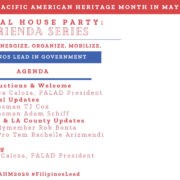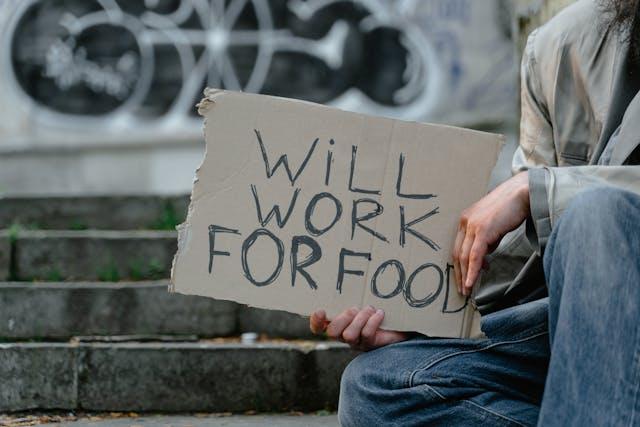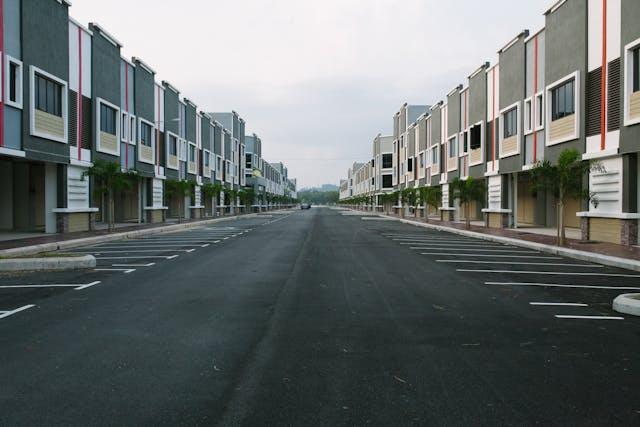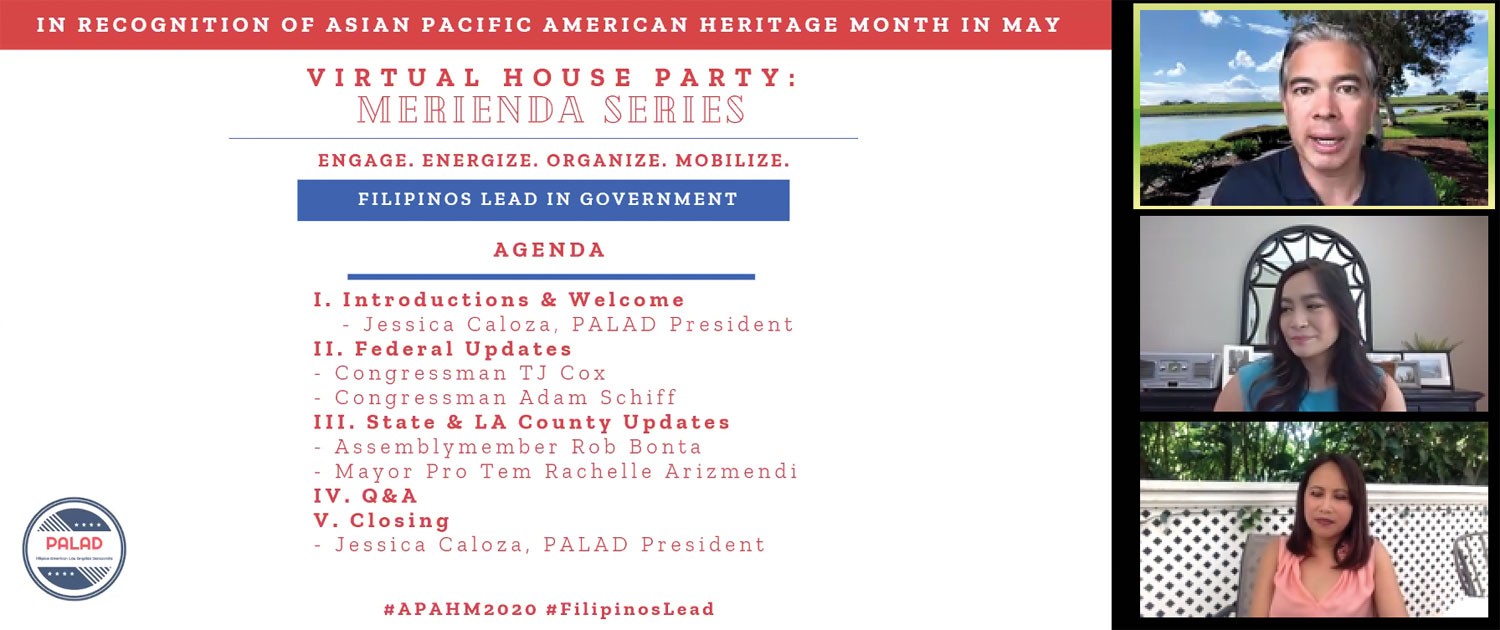
From denouncing anti-Asian sentiments to explaining economic relief options, several Filipino American elected officials in California came together in a recent town hall to share resources available to the community during the coronavirus pandemic.
Hosted by the Pilipino American Los Angeles Democrats (PALAD) on Saturday, May 2, the conversation included officials on the federal, state and local levels: Rep. TJ Cox, California Assemblymember Rob Bonta (D-Alameda) and Sierra Madre Mayor Pro Tempore Rachelle Arizmendi.
PALAD President Jessica Caloza, the first Pinay to serve as a commissioner on the LA Board of Public Works, organized the virtual town hall as the first in a series to engage with local Fil-Ams during the pandemic and leading up to November.
The bright side of hosting the event online was reaching a broader audience as Fil-Ams from across the country were able to tune in.
“We are truly trying to work together towards a common goal to save our country [and] to save our state to make sure we’re protected and come out of this pandemic stronger and that we are able to get the strength from this that we need to really win in November,” Caloza said. “What we’ve seen in the last few months is that elections have consequences.”
Bonta, the first Fil-Am elected to the California Legislature, said that while the state likely won’t have its own stimulus package, its role is “to make sure that we finish the build-out around the [federal] stimulus package so that no one is left behind. No one’s forgotten and no one falls through the cracks.”
Under the Coronavirus Aid, Relief and Economic Security (CARES) Act, the largest economic stimulus package in the country’s history passed in March, close to $2 trillion was allocated for programs, such as direct payments for up to $1,200 for those making less than $75,000 and unemployment insurance of an additional $600 per week that also covers independent contracts and self-employed individuals. However, relief for undocumented families and minority-owned businesses has been largely missing.
California announced that it has allocated $125 million to give payments for undocumented residents who don’t qualify for the federal stimulus, becoming the first state in the nation to recognize the sizeable population, Bonta said.
Other efforts the Legislature has pushed for in Governor Gavin Newsom’s executive orders is financial support for low-income students so they can complete their studies, compensation for front-liners who may contract COVID-19, and protections for farmworkers who contribute to the state’s food supply chain.
Rep. Adam Schiff, who represents the 28th District, also spoke at the town hall about the impact of Filipino Americans on California’s health care workforce, as 20% of the state’s registered nurses identify as Filipino.
“So many in the Filipino community, in particular, are on the front lines of this pandemic, and [are] showing just extraordinary courage and compassion, going to work, risking their own health, and coming home and at times having to risk or worry about the health of their family,” said Schiff.
The high-ranking congressman said a priority in Congress is to get adequate protective gear for those working in hospitals and skilled nursing facilities. His district — which is home to many Filipinos, particularly in Hollywood, Glendale and Burbank — has seen several nursing facilities have COVID-19 outbreaks. One facility in East Hollywood he mentioned had 50 staff and 90 residents test positive for the disease.
“I think the top priority for us in Congress has to be protecting our people…those on the front lines, making sure everyone has the gear that they need,” Schiff said, adding that that hazard pay for workers in high-risk professions is another consideration for the next round of federal relief.
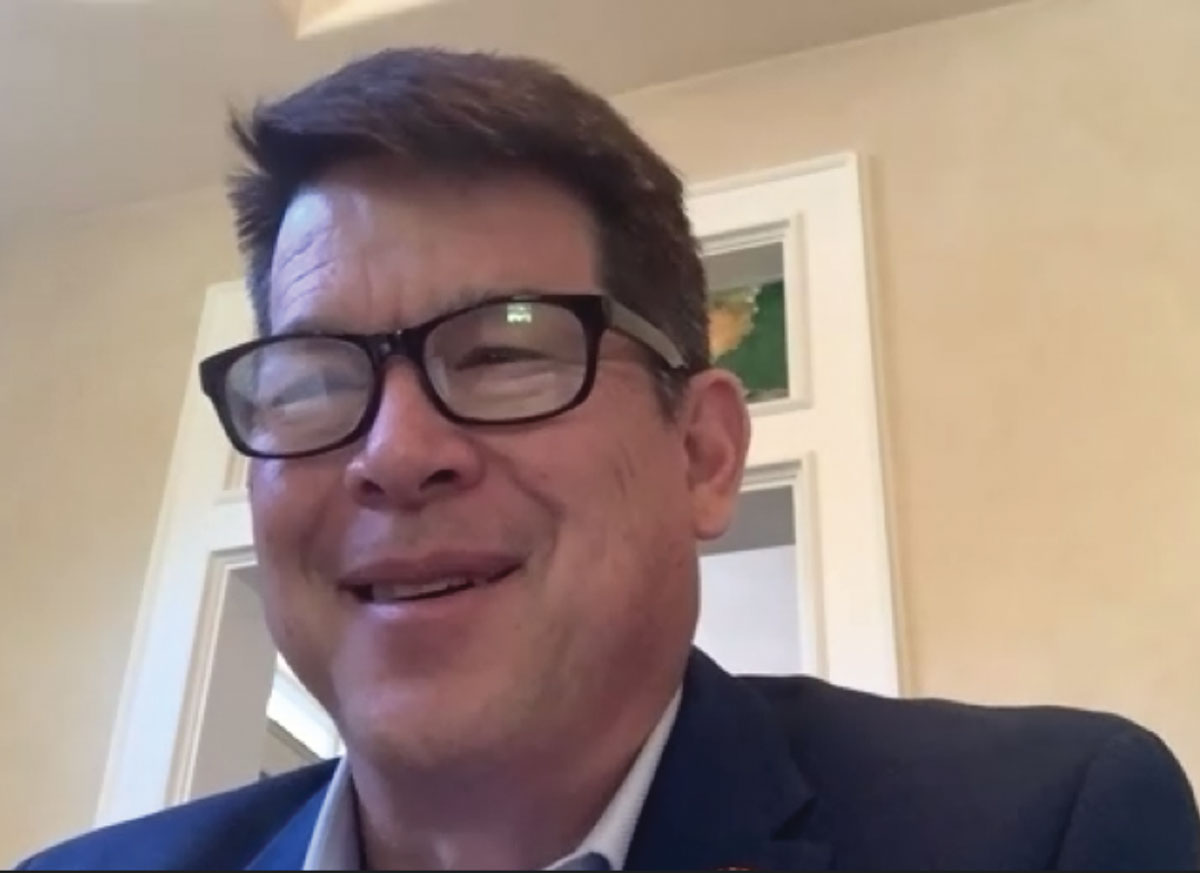
Cox — who became the first Fil-Am in Congress from California and the first Democrat to represent the Central Valley district since 1981 — spoke about his district’s challenges being agricultural and home to a large minority population.
One mission under his office is to combat falsities about cures and the origin of COVID-19, especially as they bring about stigmas targeted toward the Asian American community.
“One of the key tools that they use is certainly misinformation and that was something that I know, being Chinese and Filipino, about how dangerous could be to all of us,” Cox said. He introduced two bills: one to combat COVID-19 misinformation and another to call on the Department of Health and Human Services to fund media campaigns to spread factual information.
Arizmendi, who became the first woman of color to be on Sierra Madre’s City Council, shared her role as a board member Asian Pacific Policy and Planning Council (A3PCON), which spearheaded a reporting site for community members to document experiences of hate and discrimination.
The STOP AAPI Hate Reporting Center has reached over 1,500 reports of coronavirus-related discrimination from AAPIs across the country in the first month since it launched. Incidents from California and New York constituted over 58% of all reports, while AAPI women were harassed 2.3 times more than men.
Arizmendi said it’s important for victims to report these crimes because the data will help push for more legislation and resources.
“We want to be able to demonstrate that with numbers and actual stories so that it’s not just these hypothetical things that are happening in the community,” she said.
Saturday’s session kicked off a series of weekly town halls throughout May in recognition of Asian Pacific American Heritage Month. The next one on May 9 will have LA City Council President Emeritus Herb Wesson, former Cerritos Mayor Mark Pulido and John Santos, AAPI political director for the Democratic National Committee (DNC), speak about campaigning for the presidential election while physical distancing.


